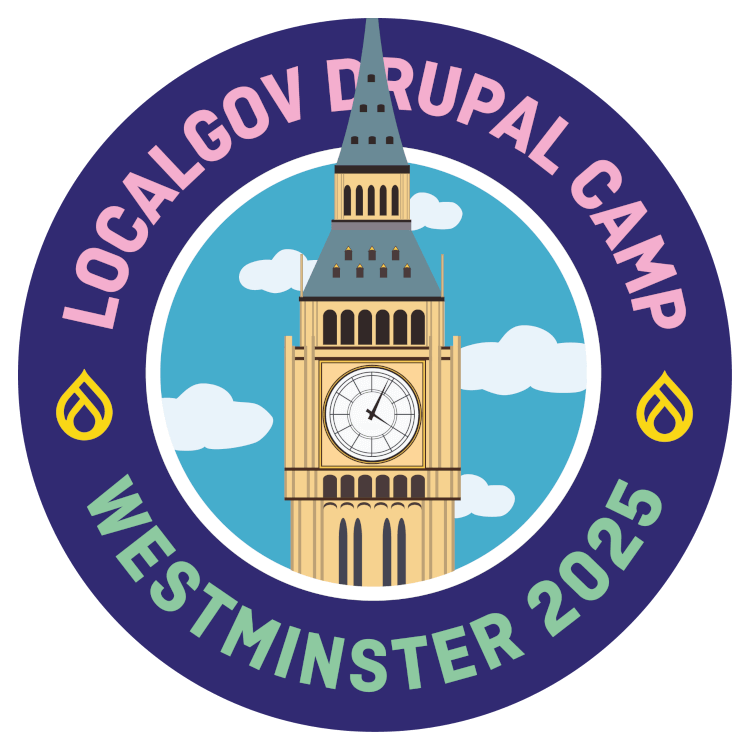
LocalGov Drupal Camp 2025 was held in The Abbey Community Centre (near Westminster Abbey in London) on July 3rd 2025. I travelled down (despite the English rail network's attempts to the contrary) for the day as an attendee.
It was a hot day in London on the 3rd July, and thankfully the Abbey Community Centre had lots of doors and windows that we could open to let some air through. Including a few fans dotted around to try and keep the rooms cool.
After a small icebreaker, where people stood up if this was their first LocalGov Camp or what sort of role they have, we started the camp with an introductory session.
LocalGov Drupal is currently being used by 57 councils currently and has around 59 council websites (including a bunch of smaller council websites) being powered by the system. It's good to see the year on year increase in coverage of this project, which has reached a decent critical mass of interest and funding.
Lots of things have happened in the year since LocalGov Drupal Camp 2024 in Birmingham.
The Drupal 11 upgrade is nearly ready and lots of effort has been done on this recently. Technically, Drupal 10 is still supported until December 2026, when Drupal 12 is released, but we still want to keep things up to date as much as possible.
The LocalGov Drupal Accessibility Governance Group was launched this year, to champion accessibility-first development and assist with the accessibility of the platform and provide councils with a collection of tools that can be used to audit and assist with accessibility.
The community fund set up last year is working; with 5 projects are being funded by this initiative (including the PDF importing which I saw more of later). Just 2-4k of funding will fund a project and then creates a feature in LocalGov Drupal that everyone can benefit from, not just the LocalGov Drupal sites. That's the key part of this system, rather than each council develop functionality on their own they will group together and collectively fund the development of what they need, saving time and money across all councils involved.
The LocalGov Drupal's current priorities are:
- Be the first choice for Local Government Reorganisation (LGR) councils.
- Save your time, be innovative and useful. - This includes looking into AI, but not jumping on the bandwagon and certainly not including AI where it doesn't benefit.
- Deliver maximum value to our subscribers, increase the value of the subscribers, and to offer tangible benefits.
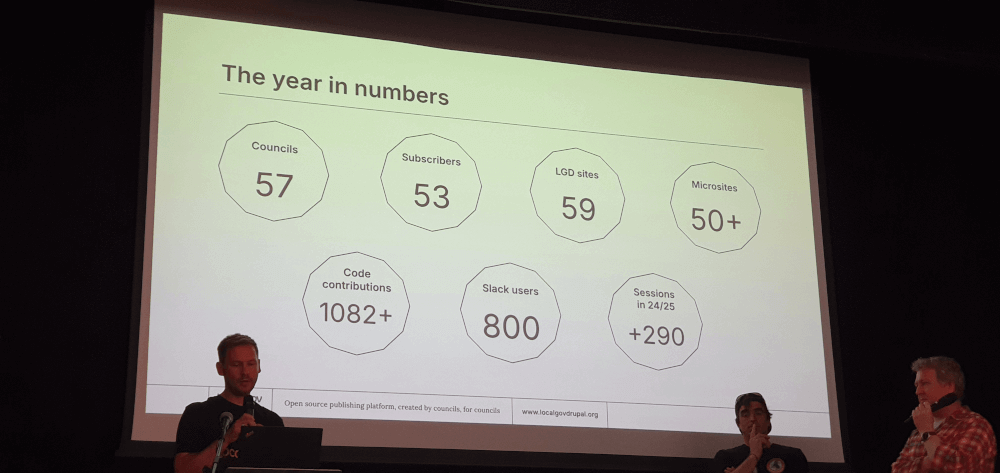
After the introduction, the first talk of the day was Building Blocks For Better Services with Alex Sturtivant, the Product Lead from Greenwich council.
This was a look at how the web team are using LocalGov Drupal to improve resident transactions at Greenwich. A resident transaction isn't just "filling in a form", but it's any interaction that a resident might have with the council. Including (but certainly not limited to) bin collections, bin collection payments, council tax payments, booking a room or a football pitch, or even requesting planning permission.
This equates to around 100k submissions a year across a wide variety of different activities and council departments. Most forms on their old infrastructure were difficult to use, or just not accessible, which meant they had a lot of problems with users dropping off half way through, or just missing out information.
Moving away from unstable technology, including 3rd party tools that disconnected transactions from their source, meant that they could standardise everything across their sites. This lead to improvements in usability and accessibility, but also allowed them to capture and communicate the data needed by the different council teams.
One important aspect of this, and Alex was kind enough to show this in action, was moving away from their current payment provider to use the gov.uk payment systems. Their current system is not fit for purpose and causes a lot of problems with users getting confused, or more often, just not trusting the platform as it does look totally off brand.
The gov.uk payment systems were easy to integrate with, had the standard design approach to gov.uk websites that has become widely trusted, and can be white labelled to fit in with Greenwich's needs.
What was interesting was that they originally thought that this functionality might take them months to implement, but the demo shown was put together in a couple of weeks. Whilst there are still some things that need altering, these are only copy and design changes at this point.
Next up was Rupert Jabelman from Chicken and Ryan Falcon-Hay from Hammersmith & Fulham Borough Council, who talked about Event Channels and Finders.
The events system is already part of LocalGov Drupal, but it has limited uses as it tends to collect all events from the entire site together into a single list. This then creates lists that have football matches, or litter picking events, alongside council meetings, which is confusing and creates a bit of clutter.
Rupert showed how he used the Finder template pattern to create a system that segments similar events into smaller buckets. Meaning that you can then set up a list of football matches that would be on a different list to council meetings, but still advertise the two as events.
In a (quite impressive) live demo Rupert went into the detail on how to create events using the new finder model, which also included a calendar view mode. The example he showed was of a series of repeating dog shows, all of which had facets that could be used to filter the events. He also went into what the next steps where before launching the update.
Quite impressive stuff really. Also, because the system is built around plugins, it is possible to create a plugin that can present a list of events in different ways.
After a lunch we had Catherine Barton and Jen Scopes from Essex County Council with Paul Jenkins from Big Blue Door. They were talking about using LocalGov Drupal to launch multiple sites using the microsite system.
Essex council had an issue with their previous technology stack that meant they had lots of different contracts for different bits of technology. This created some issues internally as they have no developers on staff and so relied on these contracts being kept up to date. If one contract was cancelled it created a technology and skills gap that they couldn't plug easily. In addition to this, developer time was often scarce and it would often cause friction between departments over what bit of work was next in the pipeline.
This is why LocalGov Drupal appealed to them so much, having everything in a single product and with a single contract simplified their lives considerably.
This was an interesting look at how Essex managed the web project, and how Big Blue Door built, deployed and maintained the site. The new Essex site is now live, and they are using the microsites system to create many smaller websites within the same platform.
The talk was about how they picked the supplier to deliver LocalGov Drupal (Big Blue Door) and how they managed the project to completion. Not only was the project to build the site, but also to create documentation for the site so that it could be picked up by anyone with knowledge of LocalGov Drupal (or even just Drupal really).
The final full talk before the closing remarks was Importing PDFs into LGD Publications with Rupert Jabelman from Chicken and Andy Broomfield from Brighton & Hove City Council.
The publications module gives LGD users the ability to upload a PDF document and extract the text within that document. This data is then used to generate a number of nodes on the site that sit within a book structure.
Whilst the current version of the publications module uses a form to ingest the information, this has now been swapped to a batch process, which allows any size of PDF document to be processed.
The key advancement recently has been adding a plugin to the PDF extraction that allows AI to be used to extract the information. Rupert showed a few demos of this in action, including using a prompt that translates the document into French on the fly.
The plugins used in the publications system means that the import process can be customised quite a bit, and the AI process is just one of the plugins available.
Extracting data using AI worked quite well. It would certainly have created less work for the user uploading the PDF document if they needed to do it by hand, but it did create quite a few problems. During the demo of translating the document into French the AI created two nodes from a 50+ page PDF document, with most of the content just being lumped into the second page.
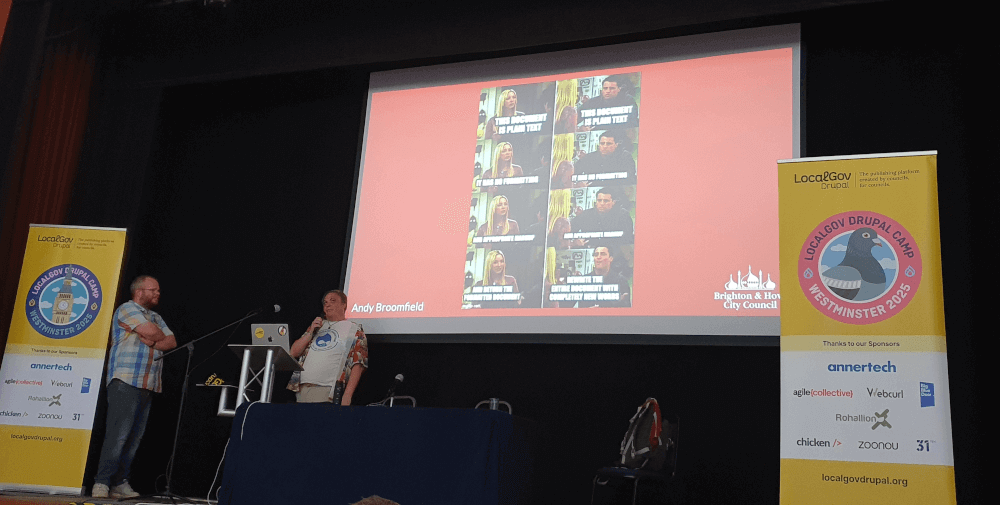
Andy Broomfield took over the second half of the talk to talk about how he has improved what the AI plugin for the publications module is doing. Since it is possible to add a custom prompt to the AI plugin it gave Andy the ability to experiment with different AI prompts to try and get a good result. Apparently it took quite a bit of experimentation to get the AI to extract the documents correctly and to also not fiddle with the text of the document.
Really interesting stuff, and it shows a good task that AI can be given that would otherwise take a human many house of boring copy pasting.
The final session of the day was a wrap up session where we had the opportunity to give feedback (via https://www.menti.com/) before we all headed over to the pub for a chat over a drink. It was lovely to catch up with people, some of which I hadn't seen in person in years.
At the pub I got talking to James Ambrahams, who co-leads the Drupal CMS AI initiative and the AI module. He had run a session at the camp that I wasn't able to attend, but it was good chatting about the use of AI in our industry and specifically around programming using AI. We were in agreement that getting AI to automate mundane or repetitive tasks is perfectly fine, but getting AI to generate content or produce code tends to lead to problems. I'm glad I had the opportunity to catch up with him.
Overall, this was a really good day, full of interesting sessions and impromptu chats with an variety of people. I quite like technical talks and it was good to see more of those talks this year (although that is a personal preference). There was a few more tracks this year so I wasn't able to attend everything, but I heard good things about the other tracks that people attended. It was also good to see the after party being quite busy this year.
The audience at LocalGov Drupal is always diverse. You will meet people with roles including Drupal developers, project managers, website managers, and council communication team members, all of which work with LocalGov Drupal in some way and are really enthusiastic about it. I find it energising to see so many people come together to improve such a critical piece of technology for the UK public.
I had a really good day from start to finish. Massive thanks to Tim, Aaron, Will and the other people involved in putting the camp together. I know it's not an easy task and the camp ran very smoothly. Apparently the venue were also very helpful in making sure we had everything we needed, including a last minute reorganisation of a few of the rooms.
Here's a picture I got of (most) of the people involved in the camp (I was stood just to the right of the official photographer.
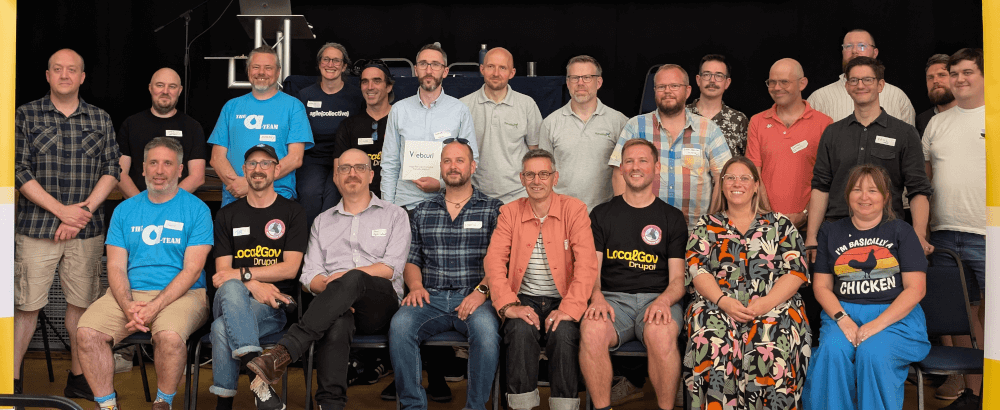
And here's the official group photo (see if you can spot me):
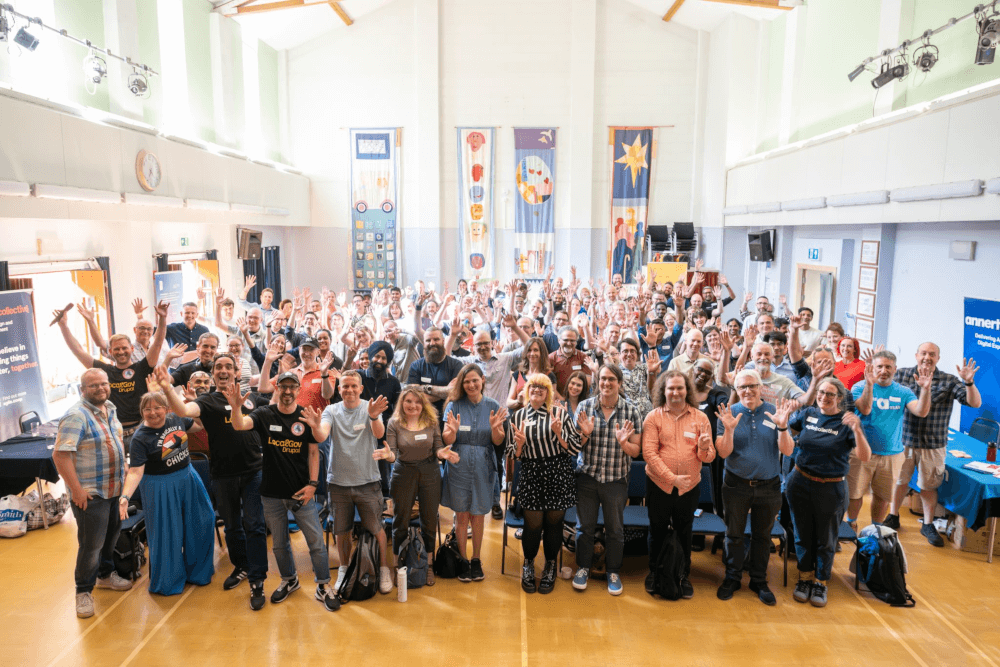
If you are interested in getting involved in LocalGov Drupal then you can start by going to https://localgovdrupal.org/, or by checking out the repos on the localgov GitHub account. There are also plenty of events you can take part in over at the LocalGov Drupal lu.ma pages. There are lots of meetups happening regularly throughout the year, including things like merge Tuesdays, the Community Meetup, and recently the Accessibility Governance meetings.
I'm now inspired to put together some ideas on presenting my own sessions at future LocalGov Drupal camps!






Add new comment